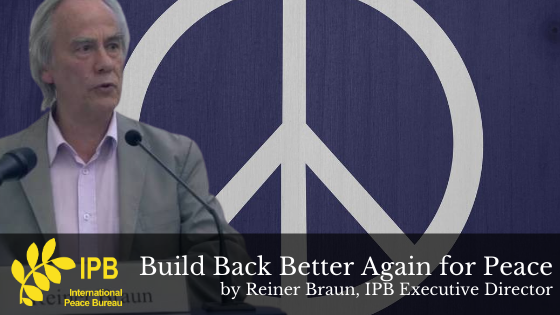We want to open a discussion on what ‘build back better’ means for peace and to develop support from the international peace movement for a very important discussion of worldwide transition.
Thoughts for a better world.
“Peace is not everything, but everything is nothing without peace.”
This sentence from the Nobel Peace Laureate Willy Brandt remains extremely relevant, above all in the midst of the Coronavirus crisis. Even in this historical moment, the world did not come together in support of the UN General Secretary’s monumental appeal for a ceasefire to stop wars and armed conflicts. But the truth remains that we need peace and disarmament to overcome the consequences of Covid-19.
The Coronavirus Pandemic has plunged countries around the world into a deep economic, political, social, and societal crisis. Millions of people are already unemployed, with the ILO warning that up to 100 million more could lose their jobs, leading to an extremely alarming growth in hunger and poverty rates.
Only wars and armed conflicts, as well as the international arms exports that make them possible, are continuing as if nothing dramatic had happened, despite the urgent call by Secretary-General Guterres and the UN Security Council. Nearly no armaments budgets have been cut, with the exception of Italy and South Korea.; the United States and NATO’s confrontations with Russia and China remain politically dominant.
The worldwide systemic crises have worsened dramatically. The question of how to overcome these crises has become a question of survival for billions of people, and a central challenge for social development, the coexistence of people, and democracy.
“Build back better” (alternatively known as creating a “new normal” or a “new dial”) is the attempt of progressive forces worldwide to develop answers to the necessary social, economic, ecological, and societal transformations.
What does build back better mean for the peace movement in the worldwide struggle for peace and disarmament?
Transformation is not possible without peace, and peace is not possible without transformation towards global and ecological justice.
Building back better for peace requires:
- Common security-based international relations, following the work of Olof Palme, Willy Brandt, Bruce Vance, Giorgi Arbatov and Bruno Kreisky – regionally anchored and based on dialogue, negotiations, cooperation, and peaceful conflict resolution. This is opposite the current trend of growing militarization in many regions of the world, such as South Asia and the European Union.
- The elimination of sanctions as part of the international political framework and as an instrument of war.
- Nuclear disarmament, including the ratification and enactment of the Treaty on the Prohibition of Nuclear Weapons (TPNW), an end to modernization processes in nuclear-armed countries, and a reallocation of money to sectors in need, such as healthcare and education. Build back better for peace means taking profound and immediate steps toward a nuclear weapon free world.
- General disarmament and a reallocation of the nearly US$ 2 trillion currently spent on militarization at the global level to create a peace dividend, which should be invested in the UN’s Sustainable Development Goals (SDGs). Social justice worldwide is impossible without general and complete disarmament.
- The conversion of the military industry and its workers to more sustainable means of production and employment. Conversion to non-military and sustainable products is the exact opposite of the current developments in the automatization of warfare and cyberwars; good work for all is our aim.
- The dissolution of military alliances such as NATO and the transfer of soldiers to work in the fields of climate resilience, peace keeping, and disaster prevention and response.
- The involvement of international organizations like the UN and regional organizations in the peaceful resolution of armed conflicts and wars through round tables that emphasize justice, dignity, and dialogue. The use of transitional justice – and truth commissions in particular – to work through the root causes of conflicts and draw lessons for future generations.
- Strict arms control that classifies arms exports as ‘criminal acts’ and conversion of the arms industry that includes a review of their criminal and often illegal activities. This includes the establishment of civil society “observer groups” to prevent a relapse into war production for profit.
- Compulsory peace education in all schools and teacher training in universities, with particular attention on gender and racial equality, alongside a ban on armament research.
- The development and establishment of new peace structures, such as Ministries of Peace, Disarmament, and Conversion in governments, with attention to intercultural affairs, the recognition of the importance of peace, and funding for organizations that promote peace.
Importantly, in this new normal, we need a new spirit of solidarity and community in society. This includes new forms of participation and democratisation, especially of the most important international organisation, the United Nations.
Reiner Braun, Executive Director of the International Peace Bureau (IPB)

